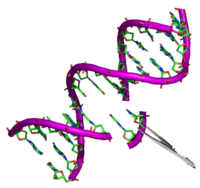
Photo from wikipedia
Only female insects transmit diseases such as malaria, dengue and Zika; therefore, control methods that bias the sex ratio of insect offspring have long been sought. Genetic elements such as… Click to show full abstract
Only female insects transmit diseases such as malaria, dengue and Zika; therefore, control methods that bias the sex ratio of insect offspring have long been sought. Genetic elements such as sex-chromosome drives can distort sex ratios to produce unisex populations that eventually collapse, but the underlying molecular mechanisms are unknown. We report a male-biased sex-distorter gene drive (SDGD) in the human malaria vector Anopheles gambiae. We induced super-Mendelian inheritance of the X-chromosome-shredding I-PpoI nuclease by coupling this to a CRISPR-based gene drive inserted into a conserved sequence of the doublesex (dsx) gene. In modeling of invasion dynamics, SDGD was predicted to have a quicker impact on female mosquito populations than previously developed gene drives targeting female fertility. The SDGD at the dsx locus led to a male-only population from a 2.5% starting allelic frequency in 10–14 generations, with population collapse and no selection for resistance. Our results support the use of SDGD for malaria vector control. A sex-distorter gene drive causes population collapse in the malaria mosquito.
Journal Title: Nature Biotechnology
Year Published: 2020
Link to full text (if available)
Share on Social Media: Sign Up to like & get
recommendations!